|
|
|
Sort Order |
|
|
|
Items / Page
|
|
|
|
|
|
|
| Srl | Item |
| 1 |
ID:
164183
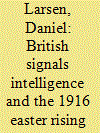

|
|
|
|
|
| Summary/Abstract |
Historians for decades have placed Room 40, the First World War British naval signals intelligence organization, at the centre of narratives about the British anticipation of and response to the Easter Rising in Ireland in 1916. A series of crucial decrypts of telegrams between the German embassy in Washington and Berlin, it has been believed, provided significant advance intelligence about the Rising before it took place. This article upends previous accounts by demonstrating that Room 40 possessed far less advance knowledge about the Rising than has been believed, with most of the supposedly key decrypts not being generated until months after the Rising had taken place.
|
|
|
|
|
|
|
|
|
|
|
|
|
|
|
|
| 2 |
ID:
164184


|
|
|
|
|
| Summary/Abstract |
This piece provides a detailed case study of the evolution of counter-terrorism within a specific domestic security agency of a liberal-democratic state in the context of the Cold War. It does so by examining the creation of a counter-terrorism unit within Canada’s Royal Canadian Mounted Police Security Service and how it responded to international terrorism. This occurred in between major terrorist attacks in Canada in 1970 and 1985 and included a growing focus on counter-terrorism even as counter-subversion remained a top priority within a still dominant Cold War domestic security framework. Ultimately, the article, based on thousands of pages of previously secret documents, argues that the Security Service could conceive of in a broader strategic sense the threat of terrorism but found it more challenging, for a variety of reasons, including the dominance of the Cold War and the difficulties around infiltrating ethnic communities, to collect intelligence.
|
|
|
|
|
|
|
|
|
|
|
|
|
|
|
|
| 3 |
ID:
164186
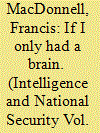

|
|
|
|
|
| Summary/Abstract |
E. Y. Harburg, the lyricist behind The Wizard of Oz, remains one of the most important songwriters blacklisted during the Cold War. His removal from Hollywood features in the 1950s denied moviegoers a distinct American voice whose lyrics mixed humor and entertainment to champion liberal causes. From 1944–1972, Director J. Edgar Hoover and the Bureau’s major field offices investigated Harburg. His declassified FBI file shows institutionalized incompetence in the way the Bureau went about writing reports, evaluating evidence, making conclusions, and conducting counter-intelligence work. Harburg’s story illuminates the battle between the left and right to shape popular culture during the Cold War. Hoover and Harburg held opposing views on politics, religion, economics, and race. Yet both men shared a fervent faith in popular culture’s capacity to transform America. Together they vied to remake the nation according to their own distinct visions – Hoover’s fear of declension stood in contrast to Harburg’s hope for radical progress.
|
|
|
|
|
|
|
|
|
|
|
|
|
|
|
|
| 4 |
ID:
164180
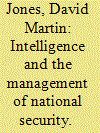

|
|
|
|
|
| Summary/Abstract |
Since 2001 expenditure on the security services has increased exponentially in Western democracies and particularly amongst the Five Eyes community of the UK, the US, Canada, Australia and New Zealand. This has occurred in conjunction with the expansion of counter-terror laws. Yet somewhat problematically the phenomenon of Islamist inspired violence became more threatening to the internal security of western democracies in the first decade of the twenty-first century. This study examines the Western managerial approach to security using Australia as a case study. It argues that the growth of Australian security agencies since 2001 and their evolution into a National Security Community after 2008 has neglected basic maxims of political and constitutional prudence and eschews the modern state’s own contractual self -understanding of sovereignty and political obligation.
|
|
|
|
|
|
|
|
|
|
|
|
|
|
|
|
| 5 |
ID:
164181
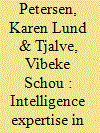

|
|
|
|
|
| Summary/Abstract |
The emergence of a more elusive and uncertain threat environment has transformed the nature of intelligence, increasing its reliance on civil society partners. Once the work of an insular and carefully select few, intelligence production is now a networked, partially open and extensively public–private enterprise. Most poignantly, new practices of public–private ‘collection’ face Western intelligence services with novel questions about control and accountability – questions to which the services have responded with hopes that by standardizing ‘methodologies’, central command may be retained. Suggesting a more complex picture, this article argues that ‘managing uncertainty’ imply forms of interpretation and choices which cannot be pre-empted by rule-regulation: more than Weber’s ideal of the procedural and rule-bound, it may be his (once central, yet largely marginalized) emphasis on institutional and individual capacities for critical ‘judgment’ that is of relevance today.
|
|
|
|
|
|
|
|
|
|
|
|
|
|
|
|
| 6 |
ID:
164185
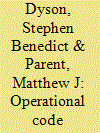

|
|
|
|
|
| Summary/Abstract |
Content analytics applied to open source material can assist in understanding, predicting, and influencing the behavior of foreign political leaders. We provide evidence to this effect by profiling Russian President Vladimir Putin, who remains a source of consternation to the academic, intelligence, and policy communities. We apply the operational code scheme to a corpus of over one million words spoken by Putin across his time in office, and use the results to adjudicate between the competing portraits of him in the extant literature. We find Putin to hold broadly mainstream beliefs about international politics, albeit qualified by hyper-aggressiveness toward terrorism and a startling preoccupation with political control. His approach is that of an opportunist rather than a strategist. These data represent a stream of information that must be combined with other sources and integrated, through policy judgment, into a comprehensive approach to a foreign political leader.
|
|
|
|
|
|
|
|
|
|
|
|
|
|
|
|
| 7 |
ID:
164182


|
|
|
|
|
| Summary/Abstract |
This article examines how Great Britain helped create Pakistan’s Inter-Services Intelligence Directorate (ISI) with two goals: (1) establishing a Pakistani branch of a Commonwealth intelligence network; (2) ensuring information security within that network. Ultimately, this endeavor failed because of perceived deficiencies in Pakistan’s security institutions and Britain’s inability to address Pakistan’s security needs. By the mid-1950s ISI forged close ties with the United States which offered more and with fewer political strings attached. This article offers new insights on intelligence alliance formation during the cold war. It also provides a useful case study in the weaknesses of multilateral intelligence coalitions.
|
|
|
|
|
|
|
|
|
|
|
|
|
|
|
|
| 8 |
ID:
164188


|
|
|
|
|
| Summary/Abstract |
This article explains the origins of the British Army’s covert counter-insurgency intelligence efforts in Northern Ireland, and shows how the army professionalized its approach to clandestine intelligence collection there. It traces the pre-1969 precedents for covert collection. It also shows that the early ad hoc efforts proved insufficient and problematic; some collection operations were exposed and compromised. Thus, the army decided to ‘professionalize’ the clandestine collection of intelligence, and created a special body–the Special Reconnaissance Unit–to handle the task. This laid the foundations for later intelligence successes and for current army intelligence doctrine.
|
|
|
|
|
|
|
|
|
|
|
|
|
|
|
|
| 9 |
ID:
164187
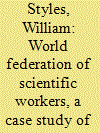

|
|
|
|
|
| Summary/Abstract |
This article examines the topic of the World Federation of Scientific Workers (WFSW) during its period of greatest activity, between 1946 and 1964. The WFSW was the only Soviet Front Organisation to be both founded in, and run from, the UK; and was a subject of intense interest for British intelligence during the early years of the Cold War. In particular, this article seeks to demonstrate how the Federation’s fortunes reflected those of the broader international ‘Peace’ movement, whilst simultaneously examining the reasons behind Whitehall’s interest in the group, and how this changed over time.
|
|
|
|
|
|
|
|
|
|
|
|
|
|
|
|
|
|
|
|
|